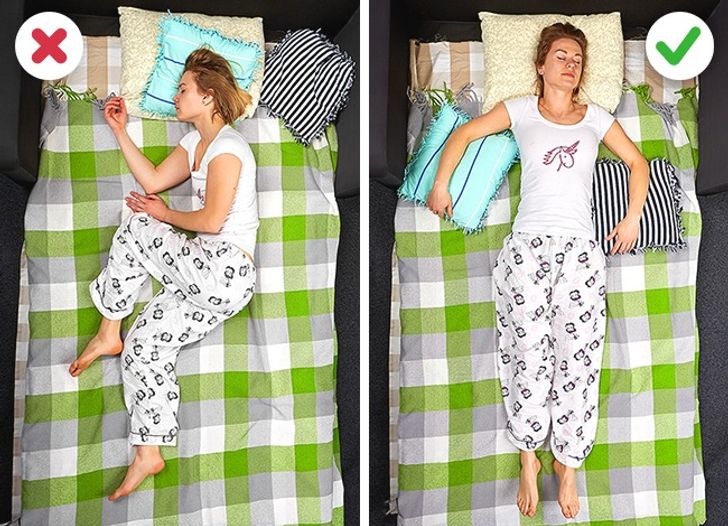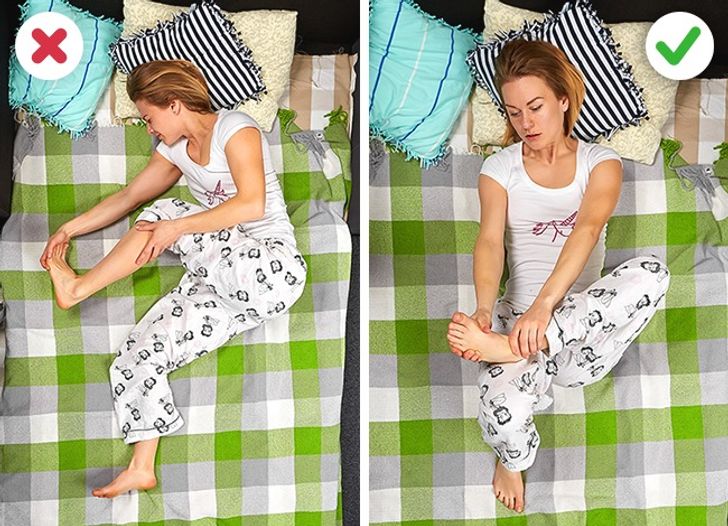We spend about a third of our life sleeping. Both the quality of our
night’s rest and our overall health depend directly on our sleep posture
and on what we do before going to bed.
We at Clamotion have put together recommendations from top specialists on how to sleep properly to fix all of your health problems.
Shoulder pain
If
you wake up with a sore shoulder, avoid sleeping on your side,
especially on the painful shoulder. It is also not advised to sleep on
your stomach since it causes misalignment of the shoulders.
The best sleeping posture is lying on your back. Put
a thin pillow (an orthopedic pillow will work best for you) under your
head. Take another pillow, place it on your stomach, and hug it. Your
shoulders will now be in the correct and stable position.
If you don’t like sleeping on your back, try lying on the side that
is not painful. Draw your legs up slightly toward your chest, and place
a pillow between your knees. Sleeping with your hand under your head is
not advisable since it produces an unnatural position of the shoulder.
Back pain
If you have back pain, maintaining the
normal curves of your spine is very important. If your mattress is
overly soft, it’s time to get a new one.
Sleeping on your back is probably the best position for you. Place
a pillow under your knees to help restore natural spinal curves and
reduce the tension in your tendons. You might also try a small rolled
towel under your lower back for additional support.
If you’re a stomach sleeper, put a pillow under your lower abdomen and pelvis so that the small of your back doesn’t move forward.
If you like sleeping on your side, then it’s best to take the fetal position. Draw
your legs up slightly toward your chest, keeping your back naturally
arched. Put a small pillow between your knees. This can help you take
the load off your lower back.
Neck pain
Just like with back pain, your neck needs to be supported while you sleep.
In general, sleeping on your back with a pillow under your head and a pillow under each arm is the best option. People with neck problems should choose their pillows very carefully, and it’s best to go for orthopedic or roll pillows.
If you prefer to sleep on your side, make sure your
pillow is not too high. It shouldn’t be thicker than 6 inches. Ideally,
the height of your pillow should match the width of one shoulder to help
keep your neck in the correct position.
If you’re a stomach sleeper, use the thinnest pillow
you can find. It’s better not to sleep in this position at all since
lying all night with your head turned to one side will strain your neck.
Can’t fall asleep
It
can be tough to banish phones and computers before bedtime, but you
should. It really helps if you have trouble falling asleep. The light
from screens affects our sleep-wake cycles.
Avoid consuming caffeine – coffee, energy drinks, soda, black tea, chocolate – at least 6 hours before going to bed.
Exercise in the morning and afternoon. This helps to tone your whole
body, improves your blood circulation, and helps you fall asleep much
faster.
Can’t stay asleep
If
you often wake up in the middle of the night, you should not only stop
using your gadgets before going to sleep but also avoid alcohol before
bedtime. Alcohol disrupts the water balance in your body and affects
your sleep cycle.
Moreover, check your room temperature. The ideal sleeping temperature is 20-22°С.
Can’t wake up
Everyone
seems to suffer from this problem, but, oddly enough, it’s very easy to
solve. Set your alarm for the same time every day (even on the
weekends). If you want to wake up early, you need to go to sleep early
in the evening.
Snoring
If you tend to snore, avoid sleeping on your back. In this position, throat tissues sag and your tongue falls backward into your throat narrowing the airway.
Choose your pillow carefully. Overly soft pillows
can cause your head to tilt backward and increase snoring. Use an extra
pillow or elevate the head of your bed a few inches to stop your tongue
from falling back over your windpipe.
Sleep on your side. With your head lying in a natural position, nothing will restrict the airflow.
Do special exercises. Exercising the muscles of your tongue and throat can help strengthen them and reduce snoring.
Leg cramps
Leg
cramps are usually sudden spasms, or tightening, of muscles in the
calf, feet, or thighs. Almost 80% of people suffer from this problem,
regardless of age. Night leg cramps are most often related to some
disease, nerve damage, or lack of trace elements. If you experience this
condition too often, talk to your doctor.
One good way to stop leg cramps is to get the calf muscle stretched and strengthened.
You can try doing yoga or massaging your legs before bedtime. Just
remember: if you want to achieve good results, you should exercise
regularly.
Other problems
Sleep disorders can be caused by many factors, from fatigue and
uncomfortable shoes to problems with the digestive or nervous system.
Only a doctor can determine the cause of the problem and advise on the
treatment.
If you suffer from frequent heartburn it’s a good
idea to lie on your left side while catching some z’s. The left-side
sleeping position prevents stomach contents from coming back up into the
esophagus, preventing heartburn.
Do you have aching legs at night? Use a roll pillow
or the foot of your bed to keep your legs lifted during sleep. The
venous blood accumulated in your legs will run downward, and you’ll feel
better. Also, try rubbing or lightly massaging your legs before
retiring for the night, and avoid consuming caffeine at least 6 hours
before bedtime.








